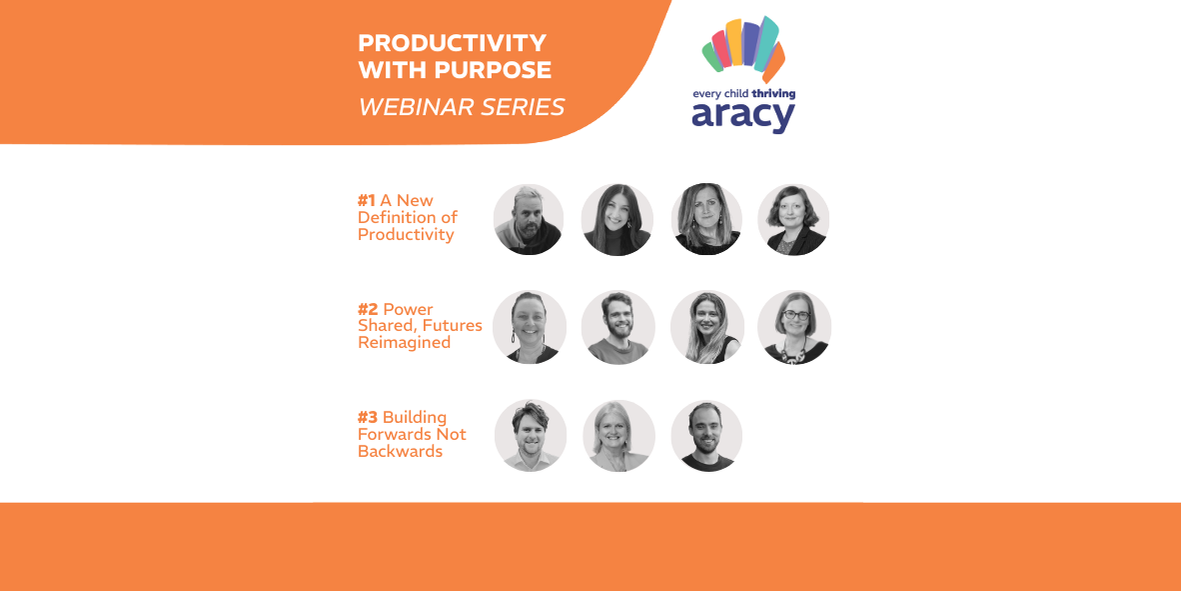
What’s the point of growth if it doesn’t improve lives?
That’s the question at the heart of ARACY’s Productivity with Purpose Webinar series over August in the lead up to and immediately after the Government’s Economic Reform Roundtable.
Across our three webinars, panellists challenged the idea that productivity is just about bigger numbers, instead asking how Australia can build an economy that works for people, protects the planet, and supports child and youth wellbeing across generations.
Friday 1 August
The opening conversation set the foundation, reminding us that productivity is not an abstract number but a proxy for living standards, and that who benefits matters most.
Here’s a glimpse of the ground we covered in our first discussion:
• Taylor Dee Hawkins challenged the idea that youth voices are optional, pointing out it’s “just good policy” to include them.
• Katherine Trebeck asked us to hold onto the bigger questions: what kind of growth, for whom, and at what cost?
• Jack Manning Bancroft pushed the frame further, arguing that unless we value joy, trust, and nature, we’re missing the real economy.
See how leaders reframed productivity as a question of who benefits, at what cost, and for how long — with young people and future generations at the centre…
Thursday 14 August
The second session moved from framing to tools – how shifting power, funding and accountability closer to communities can deliver better outcomes.
This conversation dug into how communities themselves hold the solutions when given the space and resources:
• Kerry Staines spoke of the strength that comes from Aboriginal and Torres Strait Islander communities setting their own direction with stability and voice.
• Caroline Croser-Barlow pointed to prevention and early investment as the smarter path, supporting families before challenges escalate.
• Ryan Martin emphasised that systems need to be built around children and young people — not the other way around.
• Adelaida Soltysik showed how community-led approaches can be more accountable, more innovative, and ultimately more effective.
Hear how shifting decision-making and funding closer to communities, especially Aboriginal and Torres Strait Islander voices, can unlock more sustainable outcomes.
Tuesday 26th August
The final discussion looked outward the week after the Treasurer’s Economic Reform Roundtable and analysed the outcomes and discussed the choices ahead for Australia’s social contract.
Our final conversation left us with reflections to carry forward:
• Tom Walker cut through with a challenge: balancing budgets means little if fairness and climate stability are left off the table.
• Cassandra Goldie reminded us that equity and quality in the care economy are central to any honest measure of productivity.
• Toby Phillips highlighted that lasting reform will depend on connecting the dots between tax, climate, and intergenerational fairness.
From tax reform to intergenerational fairness, catch the big questions raised after the Treasurer’s Economic Reform Roundtable, and what comes next…
Across all three conversations, one message rang clear:
productivity must be measured by its purpose, not just its pace.
Whether it was calls for intergenerational policy, prevention frameworks, or community-led decision-making, the series underscored that productivity is only meaningful if it delivers lasting fairness, wellbeing, and sustainability.
This echoes the challenge we set in our earlier article: to move beyond short-term fixes and ensure productivity reforms put children, young people and future generations at the centre.
SHARE THIS

With six connected areas, The Nest ensures young Australians have everything they need for the best start in life, helping them reach their highest potential.

Using The Nest, has helped ARACY to be at the forefront of disease prevention and the promotion of holistic health for young Australians.

Here you’ll see some examples of how The Nest has been used in organisations outside of ARACY across Australia.